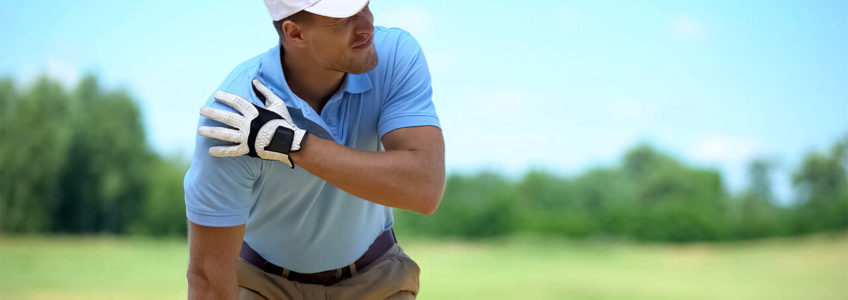
Spring is here and summer is coming soon. As the weather warms up, golfers across Southern California grab their clubs and head to the golf course, sometimes for the first time in months. This can bring on a whole host of aches and pains, and even some actual injuries.
Golf is a great sport but it is an athletic endeavor and injuries are always possible. People who play golf regularly are at risk of repetitive stress injuries. Every time you swing your club, there is a chance you might experience inflammation, stiffness and other issues that could persist for some time after the game.
While some aches acquired after playing a game of golf can resolve themselves, it is important to seek a consultation from an orthopedic professional if the pain persists. If you find yourself unable to pick up objects, do not have free range of motion or are experiencing persistent symptoms, call the team at Ventura Orthopedics
Golf Shoulder Pain Explained
A common misconception about golf is that it is a relatively low risk sport. This is actually quite far from the truth. Surprisingly, when compared to sports like rugby and hockey, the likelihood of injury is actually higher. While golf is a low-impact sport, the opportunities for overuse and poor technique are prevalent. Amateur golfers are more than twice as likely to develop injuries when compared to professional players.
For all golfers, the act of swinging can place a large amount of stress on the shoulder’s surrounding muscles, connective tissue and tendons. This stress on the shoulder is partially due to the limited pelvic rotation that takes place during the swing. With repeated use, the resulting damage to the shoulder components can lead to injuries such as rotator cuff tears—rips in the muscles that help stabilize the shoulder joint.
Which Parts of Your Shoulder Are at Risk When Playing Golf?
The entire body is used to execute a golf swing in a complex and coordinated movement. When this movement is repeated often, major stress is placed on the same muscles, tendons and joints. Over time, this can cause injury, especially if your swing mechanics are flawed.
- Rotator Cuff
Your rotator cuff is made up of four muscles and tendons that stabilize your shoulder and help you raise and rotate your arm (critical for a golf swing). Because of the significant role the rotator cuff plays in swinging a club, it is the most common place for golfers to get injured. This is the part of the shoulder that is responsible for stabilizing it overall, and it consists of four muscles and tendons. It is prone to injury from overuse, even in non-athletic situations.
- Cartilage
Cartilage is flexible connective tissue found all throughout the body. It exists in a particularly dense concentration in the shoulders. Cartilage tears (referred to as labral tears) usually occur in the back of the shoulder, and most commonly happen during a backswing.
- Scapula
The scapula (known as the shoulder blade) is not usually directly injured by going through golfing motions, but can become overworked and is prone to more serious problems. Scapular complications are usually a secondary result of other golf injuries.
How Golfers Can Avoid Pain
Some simple changes can help both pro and amateur golfers keep their shoulders healthy. The way you carry your bag, the length of your clubs, the way you turn your body through your swing and the strength of your body in general all play key roles in preventing injury. If you feel any type of shoulder pain, especially while playing, you should stop and consult a doctor before returning to the green.
- Practice Correct Technique
As with other activities that involve repetitive physical movement, bad form can quickly lead to an injury. Your swing has the biggest impact on the muscles throughout your body, including your shoulder muscles. Keep your feet shoulder-width apart and your spine straight. A proper golf swing involves all parts of the body instead of just one. Relying on your shoulders or back to power your swing can result in excess strain. If you find yourself sore after every round of golf, ask a professional to coach you on your technique.
Remember, shoulder motion should come after the hip and trunk motions when performing a downswing. Consistent soreness after a game, even without acute pain, is usually a sign that forms needs correction.
- Use the Right Equipment
Using the right equipment is another important part of ensuring that you don’t hurt yourself on the course. Longer clubs can help players who are experiencing limited range of motion due to injury or a surgery. In general, making sure your equipment is the right length and weight for you will help you perform better and avoid injuries more easily.
A golf professional can help you find a set that improves your performance and reduces strain on your shoulder. Remember to wear golf shoes that fit your feet so they help you use the right form.
- Do Not “Play Through the Pain”
If you are sore or experience pain while playing, do not try to play through it. In many cases, discomfort can resolve itself with rest, but can quickly manifest into serious injury if left ignored.
- Lift and Carry Clubs Carefully
Golfers who carry their own bags have higher rates of shoulder and back injuries than do other golfers. If you jerk heavy clubs out of the trunk of your car, you could injure yourself before you reach the first tee. Use proper lifting technique: Keep your back straight and use the strength of your legs to lift.
- Consider Strength Training
Basic strength training that focuses on your shoulder and back muscles will improve their endurance and flexibility. Targeted exercises should focus on the rotator cuff, scapula, major back muscles (the trapezius and latissimus) and the pectoralis – the large muscles of the chest. You can work with a personal trainer to find exercises compatible with any shoulder conditions you have.
- Warm up Before Your Games
Just like with any other sport, warming up before playing golf reduces your risk of injury. Stretches, jumping jacks and swing practice will keep your muscles flexible.
- Rest When Needed
If your shoulder starts to hurt while you play golf, take a break — you need to allow your muscles to heal to prevent worse damage from occurring.
Ask Your Doctor
Shoulder injuries can be incredibly painful and interfere with your work and everyday life. While some aches acquired after playing a game of golf can resolve themselves, it is important to seek a consultation from an orthopaedic professional if the pain persists.
To learn more about shoulder injuries, including your options for prevention and treatment, speaking with an orthopedic specialist is your best choice. Our skilled and experienced orthopedic surgeons will perform a thorough examination of your shoulder, analyze X-rays, and conduct physical tests.
To learn more about the procedure or to schedule an appointment with one of our rotator cuff repair specialists, call us at 800-698-1280.

